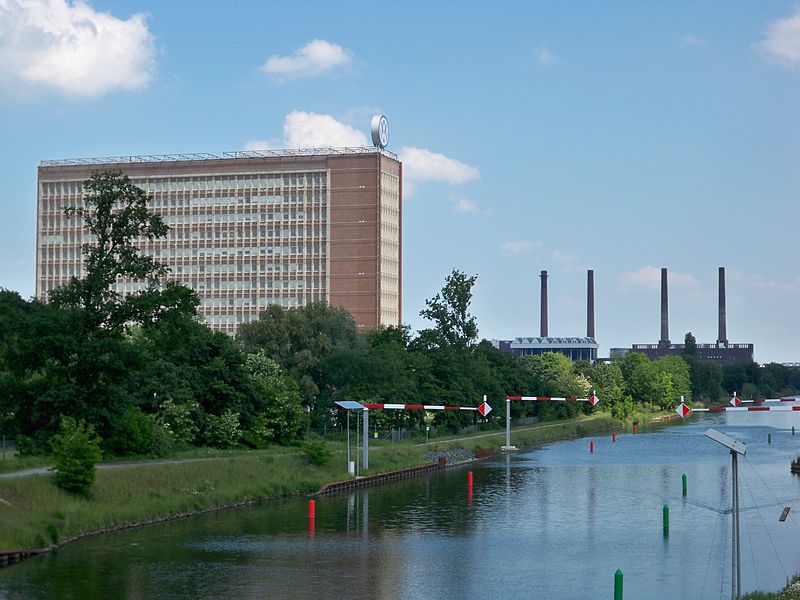
Volkswagen Headquarters (Wolfsburg, Germany)

The GM Renaissance Center (Detroit, Michigan)
Introduction
Volkswagen Group is facing a seriously lengthy run of bad luck; Germany is suing, the Italians are conducting raids, the European Parliament is disgusted & even mild-mannered Pakistan is wondering whether it should blacklist the company or pretend it didn't notice the screaming headlines in the international media. The situation is deteriorating so fast that the 20% drop in the share price & the 5 billion pounds sterling set aside in the name of damage control, is expected to prove grossly insufficient to quell the storm.
So Bad, So Fast
According to Wikipedia, a summary of VW's sorry situation would be as follows:
"The Volkswagen emissions scandal (also known as Dieselgate) began on 18 September 2015 when the United States Environmental Protection Agency (EPA) issued a Notice of Violation of the Clean Air Act to German automaker Volkswagen Group. The company had intentionally programmed their model year 2009 through 2015 turbocharged direct injection (TDI) diesel engine so that US standards nitrogen oxides (NOx) emissions were met only during laboratory emissions testing. NOx emissions during driving were up to 40 times higher. The EPA classified this programming as a defeat device, prohibited by the Clean Air Act. An estimated eleven million cars worldwide, and 500,000 in the United States, included such programming.
These findings stemmed from a study on regional emissions discrepancies commissioned in 2014 by the International Council on Clean Transportation (ICCT) summing up the data from three different sources on 15 vehicles. Among the research groups was a group of five scientists at West Virginia University, who detected additional emissions during live road tests on two out of three diesel cars. ICCT also purchased data from two other sources. They provided their findings to the California Air Resources Board (CARB) in May 2014.
Volkswagen became the target of regulatory investigations in multiple countries, and Volkswagen's stock price plunged in value by a third in the days immediately after the news. Volkswagen Group CEO Martin Winterkorn resigned, and the head of brand development Heinz-Jakob Neusser, Audi research and development head Ulrich Hackenberg, and Porsche research and development head Wolfgang Hatz were suspended. Volkswagen announced plans to spend US$7.3 billion on rectifying the emissions issues, and planned to refit the affected vehicles as part of a recall campaign. The scandal raised awareness over the higher levels of pollution being emitted by all vehicles built by a wide range of carmakers, which under real world driving conditions are prone to exceed legal emission limits. A study conducted by ICCT and ADAC showed biggest deviations from Volvo, Renault, Jeep, Hyundai, Citroën and Fiat. A discussion was sparked that software-controlled machinery will generally be prone to cheating, and a way out would be to make the software source code accessible to the public."
A Flash In The Pan
By VW's own estimate, it will take a minimum of three years to regain its market position after this scandal. So, in the meantime, who will step up to the plate & fill the VW-sized gap in the international auto market?
General Motors has had a rough year, with all the malfunctioning vehicles it has had to issue recalls for. So imagine everyone's surprise at the fact that GM's stock is actually clawing its way up the chart instead of trying to break its fall on the way down! The company is making a genuine comeback, even though brakes & ignition switches are still making headlines (& not in a good way). While the secret to GM's rejuvenation has not been disclosed by the company, most experts believe that it is no coincidence that GM is number three in terms of world auto market share - just behind VW, which at last count, held the number two position behind number one, Toyota.
Is GM angling to dislodge VW? Nobody knows just yet, but it could if it really wanted to for the following reasons:
1. 396 facilities on 6 continents (2014 figure)
2. 216,000 employees (2015 figure)
3. 9,714,652 vehicles manufactured per annum (2013 figure)
4. Total assets of US$177.677 billion (2014 figure)
5. Annual revenue of US$155.929 billion (2014 figure)
6. Global market coverage (except Cuba, Iran, DPRK, Sudan & Syria)
If the answer to the afore-mentioned question proves to be in the affirmative, these 6 factors (plus the fact that practically everyone in the world knows GM by virtue of the brilliantly-planned product placement approach applied in the Transformers film series) are likely to prove very useful to GM.
No comments:
Post a Comment